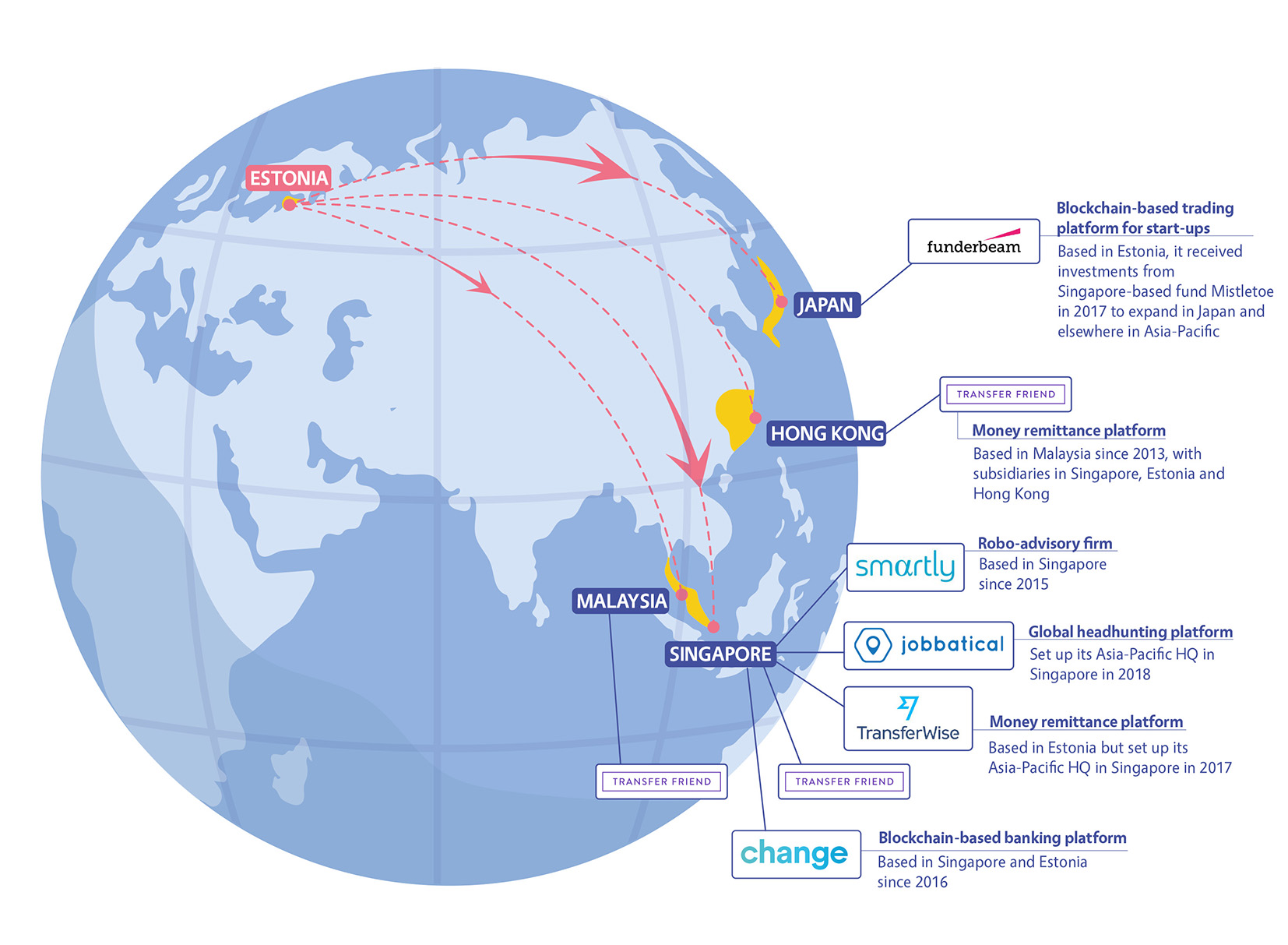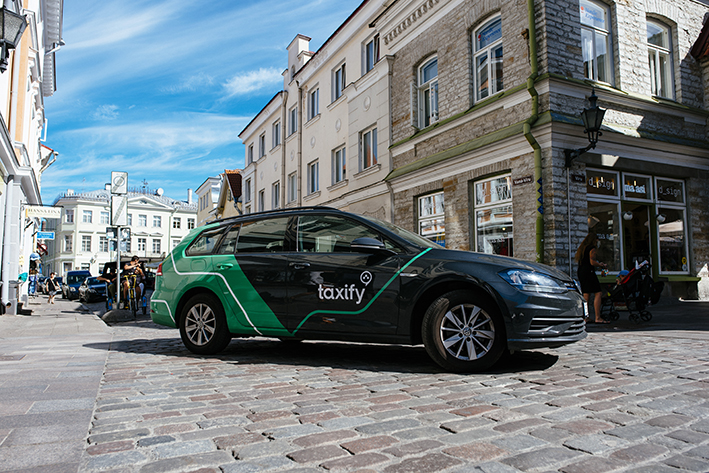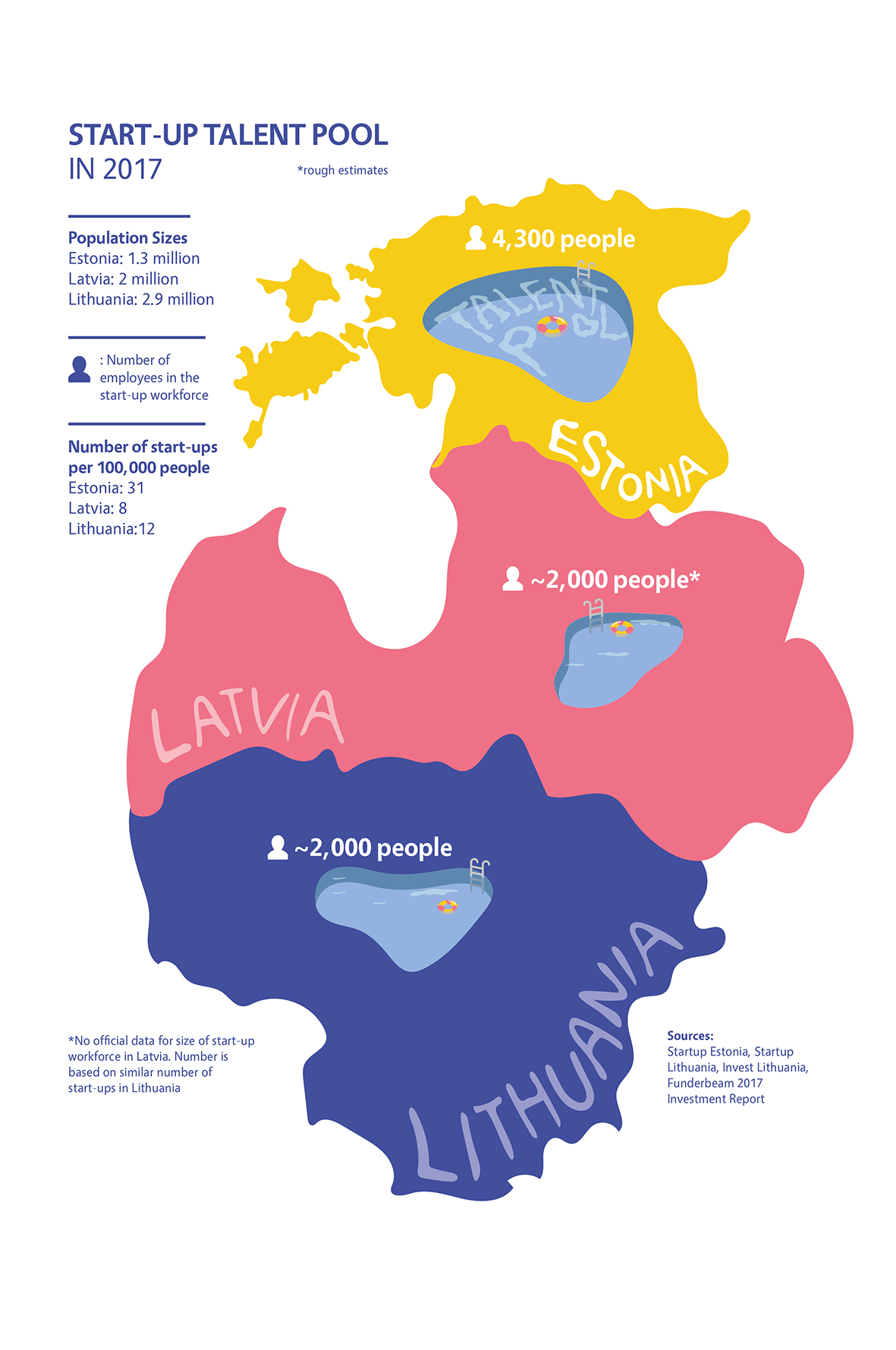Go-Far 2018: Eye on Estonia

Graphics by: Vanessa Goh
Enterprises start-up in Southeast Asia
Start-ups enticed by the region’s growing markets
By Prisca Ang
Growing up in Soviet era Estonia, entrepreneur Karoli Hindriks felt isolated from the rest of the world due to restrictions on travel and information. After Estonia regained its independence in 1991, she leapt at the chance to venture abroad, travelling to countries such as the United States and Malaysia.
A stint at a Silicon Valley think tank inspired her to set up Jobbatical, a Tallinn-based global headhunting platform that opened its Asia-Pacific headquarters in Singapore this year.
“I thought, ‘What if we collect knowledgeable and experienced people who are ready to move somewhere, and send them to places with teams that need their skills? Could we create Silicon Valleys anywhere in the world?’” said Ms Hindriks, 35, who founded Jobbatical in 2014.
Jobbatical is among a group of Estonian start-ups that are looking beyond Europe and Estonia to South-east Asia. They are spurred on by the region’s burgeoning markets and ease of doing business.
Globally, Estonia is increasingly gaining recognition for its vibrant start-up scene. Its 550 start-ups have raised about 300 million euros (S$478 million) so far this year. They received some 272 million euros from investors last year, almost triple from 2016, according to crowd-sourced data compiled by start-up events organiser Garage48.
Estonia’s most famous deal is the 2011 sale of telecommunications giant Skype for US$8.5 billion (S$11.7 billion) to Microsoft, an event which sparked a positive change in the Baltic nation’s start-up community, said founders and experts.
Ms Hindriks said: “These Estonian guys built a product that changed a whole industry, from their laptops. It gave confidence to others that they could actually change the world like that.
“The Skype founders also got very wealthy after (the sale of) Skype, so they reinvested that money back into the start-ups here. This helped to grow the ecosystem.”
Estonia has the third highest number of start-ups per capita in Europe, according to a 2017 investment report by start-up trading platform Funderbeam.
Government agency Startup Estonia also showed that Estonian start-ups employed 4,300 people, including 1,300 people working in the start-ups’ offices overseas.
These start-ups brought in 270 million euros in revenue last year, contributing 37 million euros in employment taxes, up 30 per cent from 2016.
Starting up in Asia

Graphics by: Vanessa Goh
There are currently at least 10 start-ups with a presence in South-east Asia. They have set up global and regional headquarters in South-east Asia over the past few years, or are actively developing their products to tap into new opportunities in countries like Singapore, Malaysia and Indonesia.
Jobbatical’s decision to set up shop in South-east Asia stemmed from its discovery that many Malaysian companies are extensively hiring new employees. Its data also showed that Singapore was the top South-east Asian destination searched for by the 230,000 users, who are mostly from the United States, on its platform.
The headhunter has some 3,000 client companies — a third of which are from South-east Asia, said Ms Hindriks.
“The job market in South-east Asia is growing much faster than in Europe, so I think we will see a lot more movement there,” she added.
London-based online remittance platform TransferWise, which was founded by Estonians, has also been expanding in the region. It opened its Asia-Pacific headquarters in Singapore, where it is regulated by the Monetary Authority of Singapore (MAS), last September.
The company allows users to avoid high cross-border transaction fees imposed by banks. For example, a Singaporean can deposit money into TransferWise’s bank account in Singapore. The firm then uses its British bank account to send the amount, in local currency, to the recipient in London.
TransferWise is not the only Estonian financial services firm with a foothold in South-east Asia.
Robo-advisory firm Smartly has been based in Singapore since 2015, and took its platform live last year. The automated platform analyses a user’s profile by asking him seven questions that help to determine his risk appetite, before helping him to build a diversified portfolio of exchange-traded funds.
Smartly’s founders decided to set foot in South-east Asia due to the region’s rapid growth, cultural vibrancy and untapped opportunities, said co-founder Artur Luhaäär, 25.
He and Keir Veskiväli, Smartly’s other co-founder, initially considered basing the company in Estonia. However, they wanted to venture out of their comfort zone, and had always dreamed of living and doing business in Asia.
“It’s a melting pot of so many different cultures, and we found this very exciting. At the same time, we saw that the Singapore government is very supportive of start-ups and fintech, and has an open-minded regulator, so that was many preferred ticks in various boxes,” he said.
Smartly provides the technology for the digital advisory service to MAS-regulated retail licensed fund manager VCG Partners, a unit of Vietnam’s VinaCapital Group.
Although start-ups have enough opportunities to grow in other parts of the world, like Europe, Smartly focuses on South-east Asia as it has a better chance of providing value-added services in the region, he added.
“We looked at the core problem we were solving, and we realised that investment services in Estonia or Europe were okay. We saw that the opportunities in Europe and the problems to be solved were not as groundbreaking,” said Mr Luhaäär.
Besides investment services, South-east Asia has many emerging markets with unbanked and underbanked populations, he added.
“In Europe, fintech makes banking sleeker, nicer and faster,” he said.
However, in South-east Asia, financial technology is even more meaningful as it gives people access to banking services, he added.
An example is Malaysia-based TransferFriend, founded by Estonian Herkki Väliste, which caters to foreign workers in Singapore, Malaysia and Hong Kong.
The online remittance platform allows workers from countries such as Indonesia and Nepal to save up to 85 per cent in cross-border transaction fees. It also promotes financial literacy among foreign workers through tips and personal stories on its website.
“We wanted to do something unique, so we thought about financial inclusion. We try to educate our customers on how to use smarter and cheaper ways to send money back home,” said Mr Väliste, who has been living in Malaysia for almost 10 years and founded TransferFriend in 2013.
Strong home markets

A Taxify rental car in Tallinn’s historic Old Town.
Photo by: Alvin Ho
Although Estonian start-ups are setting their sights on Asia, many of them are still thriving in markets that are closer to home.
Ride-hailing company Taxify recently became the country’s fourth unicorn — a company with a market value of over US$1 billion — after raising US$175 million in a funding round led by German automaker Daimler. The firm, which is also backed by Chinese ride-sharing giant Didi Chuxing, has a presence in over 40 cities in Europe and Africa.
“Overall, we see that we’re challenging the local monopolies. When we look at Asia, we see that there is already quite a lot of competition,” said Taxify founder Markus Villig, who founded the company in 2013, when he was only 19.
Europe has many big markets where people still hail traditional taxis, added Mr Villig. “There’s still a lot of potential to bring this to the digital world.”
Meanwhile, automated parcel solutions firm Cleveron counts the United States as its largest market. It brought in US$11 million from the US last year, and expects revenue to rise to US$40 million this year.
Based in Viljandi, a town in southern Estonia, Cleveron manufactures high-tech robots for big names such as Walmart and Zara. The machines, which appear as bright orange ‘Pickup Towers’ in Walmart, allow customers to collect their online orders in Walmart stores, reducing the need for service staff to identify and retrieve these parcels.
The firm also has a few similar towers in Estonia, which the public can use free of charge to deposit and pick up parcels with the help of an app.
“What Cleveron gives to the people is time. Previously at Walmart, the average waiting time to receive a parcel was 15 minutes. Now, thanks to this technology, customers receive 15 minutes of time,” said founder and chief executive Arno Kütt, 48.
He added: “The States wasn’t originally planned to be a place for expansion, but it just happened this way.”
Growing pains

Graphics by: Vanessa Goh
Due to their country’s small population, Estonian start-ups have a global mindset from the get-go, said start-up founders.
Said Ms Hindriks: “It’s kind of a pain and a privilege here, that you have to think globally. This means that from a very early stage, you become more competitive in the global market.”
While Estonian start-ups had to shift their headquarters to hubs like the United Kingdom or US in the past, they can now gain global recognition even if they choose to be based in Estonia, she added.
“More investors are starting to get used to the fact that you don’t need to have a London or US headquarter. You don’t need to be in the Silicon Valley to get attention, you can now be an Estonian company,” she said.
However, the country’s small population has also led to a shortage of essential tech talent, which has been a problem for its start-ups.
Mr Villig said: “When we compare the number of good engineers here, compared to other countries of the same population, there are more here. The problem is that we also have significantly more tech companies which demand that talent.”
As a result, start-ups like Taxify are increasingly seeking talent from overseas. Taxify’s employees come from 50 different countries, and make up three quarters of the firm’s total workforce. Most of them are from the ride-hailer’s largest markets, such as South Africa, France and Nigeria.
Meanwhile, companies like Cleveron have taken measures to attract new hires. The firm provides employee benefits such as free meals and tries to make work interesting for its technology team, such as allowing them to observe the real changes made to robots as a result of software implementations, said Mr Kütt.
“They don’t have to just sit behind their computers, they can work on bringing something alive,” he said.
Estonia also rolled out a new start-up visa last year, which makes it easier for Estonian start-ups to recruit people from outside the European Union. This might be welcome news for users on Jobbatical’s platform, for example, who want work in the Baltic state.
Ms Hindriks said: “Our comfort zone is not anymore the physical neighbourhood but it’s more about the mindset. People are much more globally confident.”